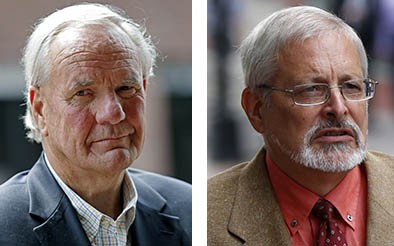In a sharp turn of events, a federal judge dismissed a complex defamation case against Paul Kendrick of Freeport on Monday, nearly a year after a jury awarded a $14.5 million verdict against him.
Kendrick lost at trial in U.S. District Court in Portland last summer, but an appellate court in Boston issued a ruling in February that put the entire case in question by asking whether the case ever belonged in federal court.
U.S. District Judge John Woodcock Jr. answered that question by backtracking through more than three years of litigation to rule that the plaintiff in the defamation lawsuit, Michael Geilenfeld, wasn’t living in the United States when he filed his claim against Kendrick and therefore the case had no grounds to be heard in a U.S. court.
The ruling dismissing the case doesn’t mean that either side necessarily wins, but more likely that the case will continue on through appeal, further arguments and possibly another trial.
Kendrick was accused of defamation after he began a widely disseminated email campaign in January 2011 accusing Geilenfeld, the American founder of an orphanage in Haiti, of sexually abusing the boys in his care. Kendrick later widened the campaign to include Hearts with Haiti, the North Carolina charity that raised donations to fund the orphanage. Kendrick declined to comment Monday other than to point out that authorities in Haiti have closed Geilenfeld’s orphanage and brought new child abuse allegations against him based on statements by more former orphans.
Kendrick’s attorney, F. David Walker IV, said that Woodcock’s ruling “essentially nullifies the jury verdict.”
“As to whether the whole case can be refiled,” he said, “I’m not sure.”
Walker said Geilenfeld and Hearts with Haiti could appeal Woodcock’s dismissal of the case.
In the trial verdict in July 2015, the Portland jury showed it did not believe seven former orphanage residents in Haiti who testified about sexual abuse, and found that Kendrick was reckless and negligent in making the accusations. It awarded actual damages of $7.5 million to Hearts with Haiti, and $7 million to Geilenfeld.
Although Hearts with Haiti is in the United States, Walker said it is his understanding that it still did not have grounds to sue Kendrick in federal court because it did so jointly with Geilenfeld, who was living at the orphanage in Port-au-Prince, Haiti, when the case was filed in 2013.
In March, Woodcock foreshadowed the legal quagmire that the jurisdiction issue could create by calling all parties before him in a courtroom to encourage them to settle the case.
At that hearing, Woodcock warned the parties to “take a hard look at themselves,” because his ruling on the jurisdiction question or the appellate court’s eventual ruling on the verdict could change the outcome entirely.
Attorney Russell B. Pierce of Norman, Hanson and DeTroy, the Portland law firm that represented Geilenfeld, expressed disappointment in the ruling.
“Although this technical ruling on jurisdiction takes the judgment away for the meantime, the verdict that was returned last July by 10 unanimous jurors remains the truth in our perspective – Mr. Kendrick spread malignant and harmful lies about Mr. Geilenfeld,” Pierce said. “No ruling on federal court jurisdiction changes the vindication that came from that unanimous verdict.”
Pierce said Geilenfeld and his attorneys are weighing the likelihood of a successful appeal. Geilenfeld’s lead attorney, Peter DeTroy III, died of a heart attack while riding his bike in Portland on May 28.
In his ruling dismissing the case, Woodcock acknowledged the complex legal path the case took before bringing him to the decision.
“In an extraordinary turn of events, while this case was on appeal to the Court of Appeals for the First Circuit, the Defendant fell upon a plausible argument that this Court never had proper jurisdiction in the first place. The argument is based on an arcane exception to diversity jurisdiction that deems American citizens domiciled abroad ‘stateless’ and renders them unable to access the federal courts on the basis of diversity jurisdiction. Here, the narrow issue is whether Mr. Geilenfeld was domiciled in Iowa or Haiti at the time he filed suit on February 6, 2013,” Woodcock wrote in his 53-page decision. “To say that the Defendant raised this issue late is an understatement, but unlike virtually any other legal issue, a court’s jurisdiction cannot be waived and may be raised at any time, even after verdict and on appeal, because jurisdiction goes to whether the court can legally hear the case.”
Though Geilenfeld had returned to Haiti after last year’s trial, his attorneys have said he is now living in the United States.
Send questions/comments to the editors.




Comments are no longer available on this story